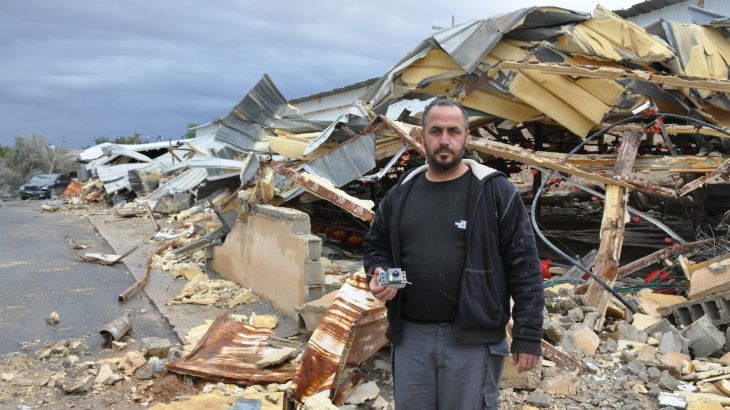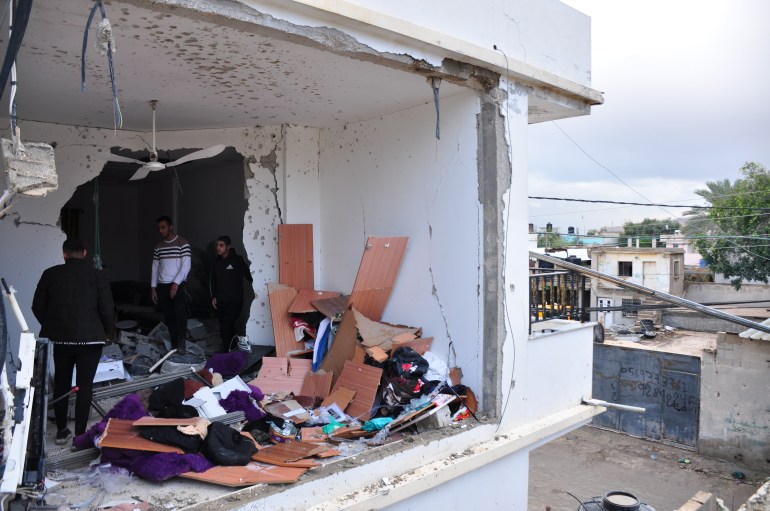Grief-stricken Palestinians recount deadly Israeli raids
Palestinian residents of the Aqabet Jaber refugee camp accuse Israeli soldiers of using excessive force and destroying property during ‘barbaric’ incursions.

Aqabet Jaber, occupied West Bank – Grief and shock fill the narrow roads of this refugee camp in the Palestinian city of Jericho.
Crowds of men and women donned in black made their way on foot from funeral to funeral, while other residents spent the morning tending to the destruction of homes, farms and vehicles.
Keep reading
list of 4 itemsIsraeli forces kill Palestinian teenager during Nablus raid
Where the ‘ironclad’ US-Israel alliance leaves Palestinians
Netflix and Israel: Did ‘Farha’ sabotage a special relationship?
Early on Monday, Israeli forces carried out a large-scale raid of the Aqabet Jaber refugee camp that lasted for six hours. When it was over, five Palestinian men were dead and two seriously wounded – all of whom remain in Israeli custody.
Four of the five men were from the Owaidat family, including two brothers: Rafaat Wael Owaidat, 21, and Ibrahim Wael Owaidat, 27, and their cousins Adham Majdi Owaidat, 22, and Thaer Owaidat, 28. The fifth man killed was Malek Lafi, 22.
The Israeli military said in a statement all seven men were armed fighters, and two of those killed were responsible for an attempted shooting at an Israeli gas station named Almog, in occupied Jericho, on January 28.
While it is certain that armed clashes took place in the camp during Monday’s raid, it remains uncertain whether the five dead and two wounded were gunmen involved.
‘Didn’t expect this barbarity’
Monday’s attack came at the end of a 10-day-long, suffocating Israeli army blockade on Jericho city, and just a day after Israeli forces carried out another major raid on the camp – on February 4 – in which more than a dozen Palestinians were wounded and many properties destroyed.
Residents told Al Jazeera the Israeli army used excessive force and caused widespread destruction in several areas of the camp during both raids, including using bulldozers, live ammunition, snipers, anti-tank grenades, and tear gas canisters.
“We didn’t expect to face this kind of barbarity and maltreatment two days in a row,” said Jihad Owaidat, 40, an uncle of two young men killed on Monday.
“They raided multiple houses in the neighbourhood, forced all the residents to stand outside for hours until the operation was over, including the women and children. They searched the men in a barbaric way – making them take off their clothes in the cold,” he said.
“Half of the children in the neighbourhood have psychological problems now.”
‘They kept beating me’
The attack on the refugee camp in Jericho came as part of increasing Israeli military raids and killings in Palestinian cities, villages and refugee camps in the occupied West Bank.
Since September 2021, a number of relatively small, cross-factional Palestinian armed groups – focused on deterring Israeli forces and protecting their areas – have been formed mainly in the cities of Jenin and Nablus. Israel has set out to crush them for more than a year.
On Saturday, the first-ever images of fighters in the Aqabet Jaber refugee camp emerged during clashes with Israeli forces. This was followed by a public statement announcing the latest armed group – the Aqabet Jaber Brigades.
While Israel claims the raids and killings target fighters, many civilians are often targeted and killed, arrested and or mistreated, and their property destroyed.
Last year was said to be the deadliest for Palestinians in the occupied West Bank since the end of the second Intifada, or mass uprising, in 2005.
Israeli forces killed 171 Palestinians, including more than 30 children, in the West Bank, while 53 other Palestinians, including 17 children, were killed during a three-day assault on the besieged Gaza Strip in August.
During Monday’s raid in Jericho, Israeli forces wrecked the small, two-storey home of 61-year-old Adel Hassan Owaidat using anti-tank Energa grenades, while he and seven family members were inside.
“Two of my sons and my nephew were on the staircase coming down to the bottom floor when our entire top floor was suddenly shelled with two grenades,” Adel told Al Jazeera.
“Minutes later, the tractor literally jammed into the bottom floor and began destroying it. The soldiers were shouting on the speaker: ‘Bring out the saboteurs!’ We told them, ‘There are no fighters in the house,’” he continued.
“They told us, ‘Come out or we will demolish the house on top of your heads.’ They made us come out, one by one, with our hands up. They strip-searched us in the freezing cold, and made us stand on the side [of the road] for hours and asked questions.”
Shortly after, Israeli forces entered the home and fired countless rounds through the walls.
Adel asked the soldiers, “You went in and searched and you didn’t find anything, so why did you keep shooting inside the house and wrecking it?”
He said it will take about 200,000 Israeli shekels ($57,400) to repair it.
Adel, along with two of his sons and nephew, were arrested and taken into custody for more questioning that lasted eight hours. All were released without charge.
“They kept beating me,” Adel’s 17-year-old son Mohammad chimed in. “They would throw us on the ground on the rocks with our hands cuffed behind our backs. They would ask: ‘Where is Malek, where is Raafat?’ And when I said I didn’t know, they would kick me and beat me with their rifles.”
Israel’s military said it was searching the camp for “members of a terror cell that attempted to carry out a shooting attack” in Jericho in January.

In another corner of the camp, the mothers of three Palestinians killed on Monday sat side by side among a crowd of family and friends who consoled them as Quranic verses played in the background.
The mothers said while they knew their sons had chosen the path of resistance and respected them for it, nothing eases the pain of losing a child.
Umm Ibrahim, the 47-year-old mother of Ibrahim and Raafat Owaidat, said Israel is “responsible for everything happening”.
“What do you think pushed my sons in this direction? They were filled with anger and pain over the everyday killings, the prisoners – everything. They had loyalty to this country,” she told Al Jazeera, noting Raafat would participate in confrontations every time the Israeli army raided the camp.
“When Raafat’s friend was arrested, he started working harder so he could cover the family’s expenses, including the lawyer,” she added.
‘Born under occupation’
Hanadi Mahmoud, mother of slain Adham Owaidat, described her son as “someone who loved life”.
“These are our lands – Israel came to us. It arrests, destroys homes, steals land. And now they kill my son and withhold his body?” she told Al Jazeera. “This is the situation of the Palestinian people – and the Palestinian mother.”
Meanwhile, the mother of Thaer Owaidat, a father to four children, said her son was “15 when he was first imprisoned”.
The young people at the camp said they expected the situation there to move towards another serious escalation.
“We were born under occupation. What happened is a response to everything that is going on at Al-Aqsa [Mosque], the massacre in Jenin, Nablus, the daily martyrs,” said Adnan al-Mgaiti, a resident in his mid-20s.
“For every Palestinian who is brave and has honour and pride, the entrance of an army four-wheel drive into the camp will never be normal. It never passes with ease. We always have confrontations during raids, but there is no media attention for Jericho.”
Adnan said while he “doesn’t know what is going to happen, it seems there are young men working” for armed resistance of the camp – as many others are across the occupied West Bank.